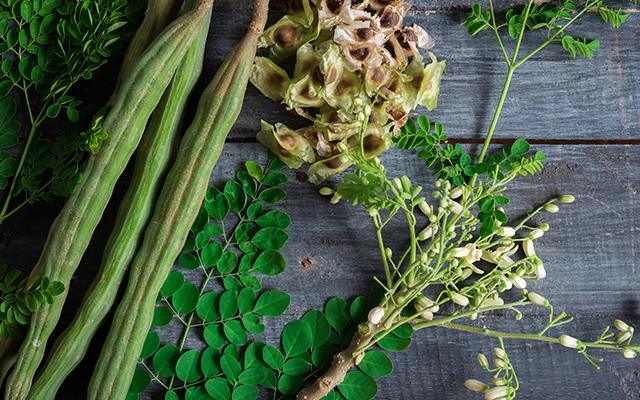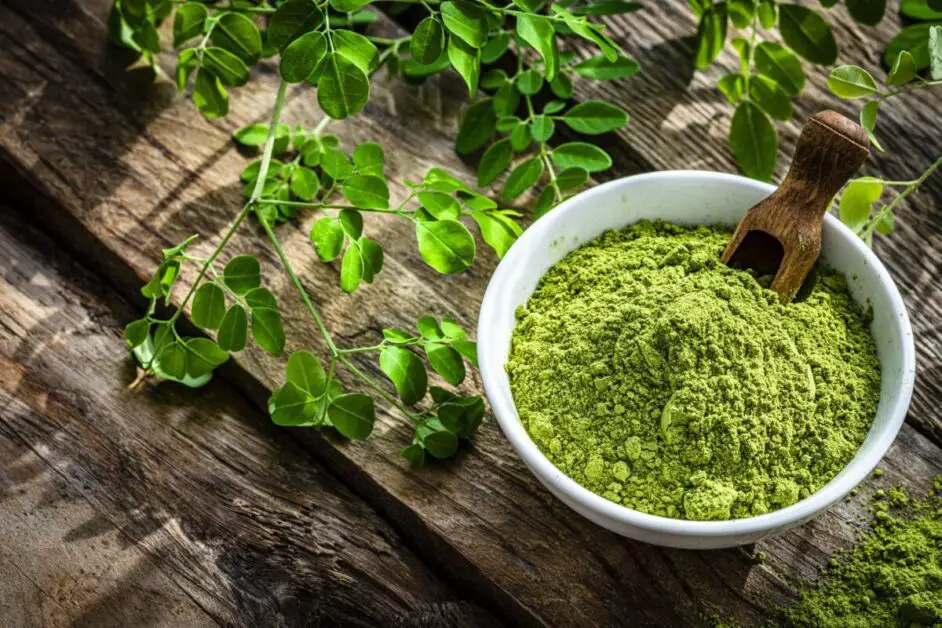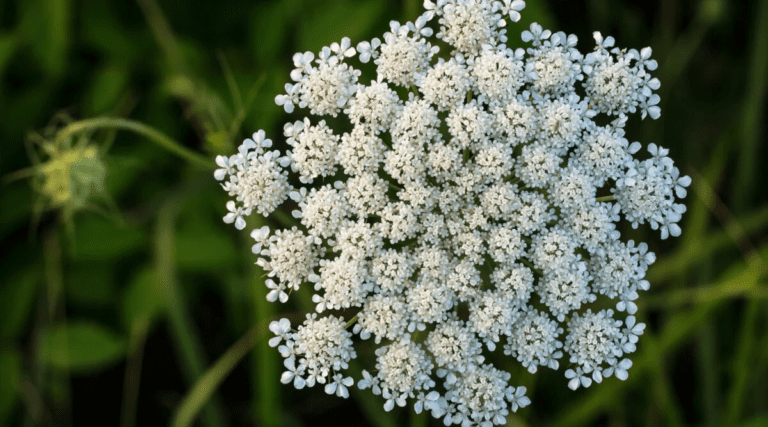Unveiling Moringa: The Majestic Drumstick Tree
The Health Benefits of Moringa: A Comprehensive Guide
Moringa, a plant native to the tropics, has gained considerable attention in recent years for its numerous health benefits. Packed with essential nutrients, vitamins, and minerals, it has been hailed as a superfood for overall well-being. From its leaves to its seeds, every part of the moringa tree offers unique health-enhancing properties.
One of the key reasons for the popularity of moringa is its impressive nutritional profile. Rich in vitamins A, C, and E, as well as calcium, iron, and potassium, moringa provides a wide array of essential nutrients necessary for maintaining good health. Additionally, it is a significant source of antioxidants, compounds that protect the body against harmful free radicals and oxidative stress.

But that’s not all. Moringa has also been recognized for its potential medicinal properties. Traditional medicine systems have long used moringa to treat various ailments, thanks to its anti-inflammatory, antimicrobial, and analgesic properties. Research suggests that moringa may have a positive impact on conditions such as diabetes, heart health, and digestive disorders.
As we delve deeper into the world of moringa, let’s explore the specific health benefits offered by its leaves, seeds, oil, powder, and tea. By understanding the unique properties of each component, we can harness the power of this extraordinary plant to support not only our physical well-being but also our overall quality of life.
1) The Origins and History of Moringa: Tracing Its Roots
Moringa, also known as the “miracle tree,” has a rich and fascinating history that spans centuries and continents. Its origins can be traced back to the foothills of the Himalayas in India, where it has been cultivated and used for its medicinal properties for thousands of years. The ancient Ayurvedic texts called it “Shigru,” recognizing its ability to alleviate a wide range of ailments.
From India, the knowledge of Moringa’s benefits slowly spread to other parts of Southeast Asia, Africa, and even South America. It became an integral part of traditional medicine systems in countries like Indonesia, the Philippines, Nigeria, and Brazil, where its leaves, seeds, and roots were used to treat various conditions.
The versatility and resilience of the Moringa tree allowed it to thrive in different climates and soil conditions, making it a valuable food and medicinal resource for diverse communities around the world. Over time, Moringa’s reputation as a nutritional powerhouse and natural remedy continued to spread, catching the attention of scientists and researchers who started uncovering its many health benefits. Today, Moringa’s rich history serves as a testament to its cultural significance and its potential to enhance well-being and nourish our bodies naturally.
2) Nutritional Value of Moringa: A Powerhouse of Essential Nutrients
Moringa, often referred to as the “miracle tree,” is truly a powerhouse of essential nutrients. Packed with vitamins, minerals, and antioxidants, it offers a wide array of health benefits that can support overall well-being.
One of the standout features of moringa is its high concentration of vitamin C. Just 100 grams of moringa leaves can provide up to 157% of the recommended daily intake of this vital nutrient. Vitamin C plays a crucial role in boosting the immune system, promoting collagen production, and aiding in the absorption of iron. Additionally, moringa leaves are rich in beta-carotene, which the body converts to vitamin A, an essential nutrient for maintaining healthy vision, supporting the immune system, and promoting skin health.
In addition to vitamins, moringa is also a great source of minerals such as calcium, magnesium, and potassium. These minerals are crucial for maintaining healthy bones, promoting proper muscle function, and regulating blood pressure. Furthermore, moringa contains a significant amount of iron, which is essential for the production of red blood cells and oxygen transportation throughout the body. With its impressive nutritional profile, incorporating moringa into your diet can contribute to meeting your daily nutrient requirements and promoting optimal health.
The chart below showss us the nutrients moringa carry per 100gm:
| Nutrient | Amount per 100g (edible portion) |
|---|---|
| Protein | 2 grams |
| Vitamin B6 | 19% of the RDA |
| Vitamin C | 12% of the RDA |
| Iron | 11% of the RDA |
| Riboflavin (B2) | 11% of the RDA |
| Vitamin A (from beta-carotene) | 9% of the RDA |
| Magnesium | 8% of the RDA |
3) Moringa as a Natural Remedy: Exploring its Medicinal Properties
Moringa, also known as the “Miracle Tree,” has garnered attention for its versatile use as a natural remedy in traditional medicine. This tropical plant, native to parts of Africa and Asia, has been revered for centuries for its medicinal properties. From relieving inflammation to boosting immunity, Moringa offers a wide range of potential health benefits.
One of the key medicinal properties of Moringa lies in its high concentration of bioactive compounds and antioxidants. These compounds, such as phenolic acids and flavonoids, play a crucial role in combating oxidative stress and reducing the risk of chronic diseases. Studies have shown that Moringa extracts possess strong antioxidant and anti-inflammatory properties, which may alleviate symptoms associated with conditions like arthritis and asthma.
Furthermore, Moringa leaves have been traditionally used as a natural remedy for digestive issues. With its rich fiber content and anti-inflammatory properties, Moringa may promote healthy digestion and relieve gastrointestinal discomfort. It has also been found to possess antibacterial and anti-parasitic properties, making it a potential natural remedy for infections caused by harmful bacteria or parasites.
While further research is needed to fully understand the therapeutic potential of Moringa, its long history of traditional use and preliminary scientific evidence highlight its promise as a natural remedy. As interest in alternative and complementary medicine continues to grow, Moringa’s medicinal properties offer a compelling avenue for exploration and potential relief for various health conditions.
4) Moringa Leaves: A Superfood for Overall Well-being
Moringa leaves, with their vibrant green color and unique shape, are not just visually appealing but also offer a multitude of health benefits. Packed with essential nutrients, these leaves have gained popularity as a superfood for promoting overall well-being.
One of the remarkable qualities of moringa leaves is their high nutritional value. They are a rich source of vitamins and minerals, including vitamin A, vitamin C, calcium, iron, and potassium. In fact, studies have shown that moringa leaves contain more vitamin C than oranges, more calcium than milk, and more iron than spinach. This nutritional powerhouse provides the body with essential nutrients that are needed for various bodily functions, such as boosting the immune system, supporting bone health, and maintaining normal blood pressure levels.

Furthermore, moringa leaves are known for their antioxidant properties. Antioxidants help protect the body against oxidative stress, which is linked to various chronic diseases, including heart disease, diabetes, and certain types of cancer. Research has shown that the antioxidants present in moringa leaves, such as flavonoids and polyphenols, can help neutralize harmful free radicals and reduce inflammation in the body. By incorporating moringa leaves into your diet, you can harness the power of antioxidants to support your overall well-being and reduce the risk of chronic diseases.
5) Moringa Seeds: Unlocking their Potential Health Benefits
Moringa seeds, often referred to as “drumstick seeds,” are small yet mighty powerhouses of nutrients. Packed with essential vitamins, minerals, and antioxidants, these seeds offer a range of potential health benefits. From enhancing immunity to promoting healthy digestion, the diverse array of nutrients found in moringa seeds make them a valuable addition to any diet.
One of the key benefits of moringa seeds lies in their high antioxidant content. Antioxidants help combat oxidative stress and free radicals in the body, protecting cells from damage and reducing the risk of chronic diseases. Studies have shown that moringa seeds contain a significant amount of antioxidants, including phenolic compounds and flavonoids, which contribute to their powerful health-promoting effects.
Moreover, moringa seeds are a rich source of essential fatty acids, including omega-3 and omega-6. These fatty acids play a crucial role in maintaining brain health, reducing inflammation, and supporting cardiovascular function. Incorporating moringa seeds into your diet can help nourish your body with these vital nutrients, contributing to overall well-being.
6) Moringa Oil: The Versatile Elixir for Skin and Hair
Moringa oil, derived from the seeds of the Moringa oleifera tree, is a versatile elixir that has been valued for centuries for its nourishing and healing properties. This oil is rich in essential nutrients, antioxidants, and fatty acids, making it a valuable addition to your skincare and haircare routines.
When it comes to skincare, Moringa oil is renowned for its ability to moisturize and rejuvenate the skin. Its high levels of antioxidants, such as vitamin E and vitamin C, help combat free radicals and reduce the signs of aging, such as wrinkles and fine lines. Additionally, the oil’s anti-inflammatory properties can soothe irritated skin and alleviate conditions like eczema and psoriasis.

Furthermore, Moringa oil can work wonders for your hair, promoting strength, shine, and overall hair health. Its nourishing properties help to hydrate and condition the hair, making it less prone to breakage and split ends. Regular use of Moringa oil can also help reduce dandruff, soothe the scalp, and stimulate hair growth.
Incorporating Moringa oil into your skincare and haircare routines can provide numerous benefits, leaving you with healthier and more radiant skin and hair. Its versatility and natural goodness make it a worthwhile investment for those seeking to enhance their beauty regimen the natural way. So why not give Moringa oil a try and experience the powerful elixir for yourself?
7) Moringa Powder: A Convenient Way to Boost Your Health
Moringa powder has gained significant popularity in recent years due to its convenience and numerous health benefits. This powdered form of the moringa plant offers a concentrated dose of essential nutrients, making it an excellent addition to your daily routine.
One of the key advantages of using moringa powder is its versatility. The powder can be easily incorporated into a variety of recipes, such as smoothies, soups, or even baked goods. This convenience allows you to boost your nutrient intake without making drastic changes to your diet.
In terms of its nutritional value, moringa powder is packed with vitamins, minerals, and antioxidants. It is particularly rich in vitamin C, vitamin A, and iron, all of which play vital roles in supporting overall health and well-being. These nutrients can help strengthen the immune system, promote healthy skin, and support the body’s natural detoxification process.
Furthermore, moringa powder is also known for its ability to provide an energy boost. It contains high levels of amino acids, which are the building blocks of protein. These amino acids help enhance energy production, making it an excellent choice for those looking to improve their stamina and endurance.
Moreover, studies have shown that consuming moringa powder may help regulate blood sugar levels, lower cholesterol, and reduce inflammation. These findings highlight the potential of moringa powder as a natural remedy for managing certain health conditions.
In conclusion, incorporating moringa powder into your daily routine can be a convenient way to boost your overall health. Its versatility, rich nutrient profile, and potential health benefits make it a valuable addition to any diet. Whether you blend it into your favorite smoothie or sprinkle it over your meals, moringa powder is an easy and accessible way to support your well-being. Keep reading to learn more about the various forms and uses of moringa in our comprehensive guide.
8) Moringa Tea: A Soothing and Nourishing Beverage
Moringa tea has gained popularity in recent years for its soothing and nourishing properties. Made from the leaves of the moringa tree, this beverage offers a range of health benefits that make it a great addition to your daily routine.
One of the key advantages of moringa tea is its high antioxidant content. Antioxidants help protect our cells from damage caused by harmful free radicals, which can contribute to the development of chronic diseases. Moringa leaves are packed with antioxidants such as quercetin and chlorogenic acid, which have been shown to have anti-inflammatory and anti-cancer properties. By incorporating moringa tea into your diet, you can strengthen your body’s defenses and promote overall well-being.
Additionally, moringa tea is a rich source of essential nutrients. It contains significant amounts of vitamins A, C, and E, as well as minerals like calcium, potassium, and iron. These nutrients are crucial for maintaining a healthy immune system, promoting bone health, and supporting cognitive function. By sipping on a cup of moringa tea, you can give your body a nourishing boost and ensure that you’re getting the vital nutrients it needs to thrive.
9) Moringa in Traditional Medicine: Ancient Wisdom Rediscovered
Moringa, commonly known as the “Tree of Life,” has been used for centuries in traditional medicine to promote health and well-being. This ancient wisdom surrounding the healing properties of Moringa is now being rediscovered in modern times.
In traditional medicine practices, various parts of the Moringa tree, including the leaves, seeds, and roots, are used to treat a wide range of ailments. The leaves, which are rich in vitamins, minerals, and antioxidants, are often consumed as a tea or added to meals to enhance immune function and promote overall vitality. The seeds, on the other hand, are known for their antimicrobial properties and are commonly used to treat infections and skin disorders. Additionally, the roots of the Moringa tree have been used traditionally to alleviate digestive issues and reduce inflammation in the body.
While scientific research on Moringa’s medicinal benefits is still ongoing, preliminary studies have shown promising results. For example, research suggests that Moringa leaves may have anti-inflammatory, antimicrobial, and antioxidant properties, which could help protect against chronic diseases such as heart disease and cancer. However, it is important to note that further studies are needed to fully understand and validate the potential health benefits of Moringa in traditional medicine.
Here is a table that shows the ancient uses of moringa in medicine:
| Traditional Uses of Moringa in Medicine | Description |
|---|---|
| Promoting Digestive Health | – Used to alleviate digestive issues such as constipation, bloating, and gas. Moringa leaves and extracts may help soothe the digestive tract. |
| – Rich in vitamins and antioxidants, Moringa aids in fighting off infections. | |
| Boosting Immunity | – Traditional medicine employs Moringa to strengthen the immune system. Rich in vitamins and antioxidants, Moringa aids in fighting off infections. |
| Managing Inflammation | – Moringa’s anti-inflammatory properties are utilized to ease inflammation-related conditions. Effective in alleviating symptoms of arthritis and asthma. |
| Wound Healing | – Applied topically, Moringa aids in wound healing and promotes tissue repair. Its antimicrobial properties help prevent infections in wounds. |
| Nourishing Skin and Hair | – Moringa oil is used in traditional medicine for moisturizing skin and hair. Rich in vitamins and minerals, it supports healthy skin and hair growth. |
| Alleviating Respiratory Issues | – Moringa is employed to alleviate symptoms of respiratory conditions like asthma and bronchitis. Its expectorant properties help loosen mucus and clear airways. |
10) Moringa’s Role in Managing Diabetes: A Promising Approach
Moringa’s Role in Managing Diabetes: A Promising Approach
As the number of people diagnosed with diabetes continues to rise, researchers and healthcare professionals are constantly seeking new ways to manage and control this chronic condition. One promising approach that has gained attention in recent years is the use of Moringa as a potential aid in diabetes management.
Moringa, also known as the “miracle tree,” has long been recognized for its nutritional and medicinal properties. It is rich in vitamins, minerals, and antioxidants, making it a valuable addition to a balanced diet. In the context of diabetes, Moringa’s potential benefits lie in its ability to regulate blood sugar levels.
Studies have suggested that Moringa leaves and extracts may have a positive impact on blood glucose control. Research conducted on animals has shown that Moringa extracts can reduce blood sugar levels and improve insulin sensitivity, which are crucial factors in managing diabetes. Additionally, Moringa’s antioxidant properties may help reduce oxidative stress, a contributing factor to insulin resistance and complications associated with diabetes.
While these findings are promising, it is important to note that more research is needed to fully understand Moringa’s role in managing diabetes in humans. Clinical trials and studies on larger population samples will help validate these initial findings and provide a clearer picture of the potential benefits of incorporating Moringa into a diabetes management plan.
In the next section, we will explore the various ways in which Moringa can be incorporated into a balanced diet and discuss some practical tips for individuals with diabetes. Stay tuned for valuable insights on how Moringa can play a role in supporting your journey towards better diabetes management.
11) Moringa for Heart Health: Supporting Cardiovascular Wellness
Moringa, a nutrient-dense superfood, is not only known for its exceptional nutritional value but also for its potential role in supporting cardiovascular health. Numerous studies have suggested that incorporating moringa into one’s diet may contribute to a healthier heart.
One of the key reasons why moringa is believed to benefit heart health is its high antioxidant content. Antioxidants help protect the body against oxidative stress, a condition characterized by an imbalance between the production of harmful free radicals and the body’s ability to neutralize them. Oxidative stress has been linked to various cardiovascular conditions, including heart disease and high blood pressure. Moringa’s potent antioxidants, such as quercetin and vitamin C, may help reduce oxidative damage and inflammation in the arteries, thereby promoting better heart health.

Moreover, moringa leaves are rich in compounds like flavonoids and polyphenols, which have been shown to possess anti-inflammatory properties. Chronic inflammation is often associated with the development of cardiovascular diseases, as it can lead to the buildup of plaque in the arteries and increase the risk of blood clots. By reducing inflammation, moringa may help maintain the integrity of the cardiovascular system and support overall heart wellness.
While scientific research on moringa’s specific effects on heart health is still advancing, these preliminary findings highlight the potential of incorporating moringa into a heart-healthy diet. However, it’s essential to consult with a healthcare professional before making any changes to your dietary routine, especially if you have underlying cardiovascular conditions or are taking any medications. With further investigation and understanding, moringa may indeed emerge as a natural ally in the pursuit of optimal cardiovascular wellness.
12) Moringa and Weight Loss: Separating Fact from Fiction
Weight loss is a topic that has been surrounded by countless myths and misconceptions over the years. With the rise in popularity of various diets and supplements, it can be challenging to separate fact from fiction. One such product that has been touted for its weight loss benefits is moringa.
Moringa is a nutrient-dense plant that is believed to aid in weight loss due to its high fiber content. Fiber plays an essential role in weight management as it helps to keep you feeling satisfied and full for longer periods, reducing the chances of overeating. Additionally, moringa is also low in calories, making it a suitable addition to a calorie-controlled diet.
While moringa may offer some benefits in terms of weight management, it is important to note that it is not a magical solution for shedding pounds. Achieving sustainable and healthy weight loss requires a combination of a balanced diet, regular physical activity, and lifestyle modifications. Incorporating moringa into your diet can be a part of a comprehensive weight loss plan, but it is not a standalone solution. As with any dietary change, it is recommended to consult a healthcare professional or a registered dietitian to ensure that moringa fits well into your individual nutrition needs and goals.
13) Moringa as an Anti-inflammatory Agent: Easing Aches and Pains
Moringa, also known as the “miracle tree,” has gained significant attention in recent years due to its potential anti-inflammatory properties. The plant contains various bioactive compounds that have been shown to mitigate inflammation and alleviate aches and pains. Research suggests that the powerful antioxidants present in Moringa play a crucial role in reducing inflammation markers in the body.
One study conducted on rats found that Moringa leaf extract significantly decreased the levels of pro-inflammatory molecules, such as tumor necrosis factor-alpha (TNF-α) and interleukin-6 (IL-6), while increasing the levels of anti-inflammatory cytokines. These findings indicate that Moringa may possess the ability to modulate the immune response and alleviate inflammation, making it a natural alternative to conventional medications.
In addition to its anti-inflammatory properties, Moringa contains high levels of vitamins A and C, which contribute to immune function and tissue repair. These nutrients, combined with the plant’s potent anti-inflammatory compounds, make Moringa a promising option for those seeking natural relief from aches and pains. However, further research is needed to determine the specific mechanisms through which Moringa exerts its anti-inflammatory effects and to establish optimal dosage recommendations.
14) Moringa and Digestive Health: Soothing the Gut Naturally
Moringa, commonly known as the “Miracle Tree,” has been revered for its potential to soothe the gut and promote digestive health naturally. Its leaves are rich in various nutrients, including fiber, which plays a crucial role in supporting a healthy digestive system.
Fiber acts as a bulking agent, aiding in the smooth movement of food through the digestive tract and preventing constipation. Moringa leaves provide a significant amount of dietary fiber, making them an excellent addition to your diet if you’re looking to improve your digestive health.
Additionally, Moringa leaves contain compounds with anti-inflammatory properties, such as isothiocyanates. These compounds have been shown to help reduce inflammation in the gastrointestinal tract, which can help alleviate symptoms of digestive disorders like irritable bowel syndrome (IBS) and inflammatory bowel disease (IBD). By soothing inflammation, Moringa may contribute to a calmer and healthier gut, promoting overall digestive well-being.
However, while Moringa shows promise in soothing the gut naturally, it’s important to note that more research is needed to fully understand its effects on specific digestive conditions. Consulting with a healthcare professional is recommended before incorporating Moringa or any other supplement into your routine, particularly if you have an underlying medical condition or are taking medications that could potentially interact with it.
To unravel the benefits of moringa watch the video.
15) Moringa’s Potential Anti-cancer Properties: Current
Moringa, a nutrient-packed superfood, has gained popularity in recent years for its potential anti-cancer properties. While more research is needed to fully understand its effects on different types of cancer, several studies have shown promising results. One study published in the journal PLOS One found that Moringa leaf extract exhibited anti-cancer activity against colorectal cancer cells in laboratory tests. The researchers attributed this effect to the presence of bioactive compounds, such as flavonoids and phenolic acids, which are known for their antioxidant and anti-inflammatory properties.
Another study, published in the journal Oncology Letters, investigated the potential anti-cancer effects of Moringa leaf extract on breast cancer cells. The results suggested that the extract inhibited the growth and migration of breast cancer cells, indicating its potential as a therapeutic agent for breast cancer treatment. Additionally, Moringa leaf extract has been found to enhance the effectiveness of chemotherapy drugs in killing cancer cells, according to a study published in the journal Molecular and Clinical Oncology.
These preliminary findings suggest that Moringa may hold promise in the fight against cancer. However, it is important to note that these studies were conducted in the laboratory and on isolated cells. Further research, including clinical trials on human subjects, is needed to determine the safety and efficacy of Moringa as a cancer-fighting agent. Nonetheless, incorporating Moringa into a balanced and healthy diet may offer potential benefits for overall well-being and may complement traditional cancer treatments.
What are the potential anti-cancer properties of Moringa?
Moringa has been studied for its potential anti-cancer properties. It contains compounds that have shown to inhibit the growth of cancer cells and reduce the risk of certain types of cancer.
How does Moringa exhibit its anti-cancer properties?
Moringa contains various bioactive compounds such as flavonoids, phenolic acids, and glucosinolates that possess anti-cancer properties. These compounds have been found to induce apoptosis (cell death) in cancer cells, inhibit tumor growth, and prevent the spread of cancer cells.
Which types of cancer have been studied regarding Moringa’s anti-cancer properties?
Studies have primarily focused on the potential anti-cancer effects of Moringa on breast, colorectal, lung, and liver cancers. However, research is ongoing to explore its effects on other types of cancer.
Can Moringa be used as a standalone treatment for cancer?
Moringa should not be considered as a standalone treatment for cancer. While it shows promise in inhibiting cancer cell growth, it should be used as a complementary therapy alongside conventional cancer treatments, under the guidance of a healthcare professional.
Are there any potential side effects of using Moringa for its anti-cancer properties?
Moringa is generally safe when consumed in moderation. However, excessive consumption of Moringa supplements may cause digestive issues such as diarrhea and stomach cramps. It is always recommended to consult with a healthcare professional before incorporating Moringa into your cancer treatment regimen.
Can Moringa completely cure cancer?
Moringa cannot be claimed as a cure for cancer. While it may have anti-cancer properties, the effectiveness of Moringa in treating cancer is still being researched. It is essential to rely on proven medical treatments and consult with healthcare professionals for appropriate cancer management.
Can Moringa prevent cancer?
Moringa’s potential anti-cancer properties may help reduce the risk of certain types of cancer. However, it is important to note that no single food or supplement can guarantee the prevention of cancer. Maintaining a healthy lifestyle, including a balanced diet, regular exercise, and avoiding risk factors, is crucial for cancer prevention.
How should Moringa be consumed to potentially benefit from its anti-cancer properties?
Moringa can be consumed in various forms such as fresh leaves, powdered form, tea, or oil. It is important to follow recommended dosages and consult with a healthcare professional for guidance on incorporating Moringa into your diet for potential anti-cancer benefits.
Is Moringa suitable for everyone looking to potentially benefit from its anti-cancer properties?
While Moringa is generally safe for consumption, individuals with certain medical conditions, pregnant or breastfeeding women, or those taking specific medications should consult with a healthcare professional before using Moringa for its potential anti-cancer properties.
Are there ongoing studies or research on Moringa’s anti-cancer properties?
Yes, research on Moringa’s anti-cancer properties is still ongoing. Scientists and researchers continue to study its potential effects on different types of cancer, exploring the mechanisms of action and evaluating its safety and efficacy.







